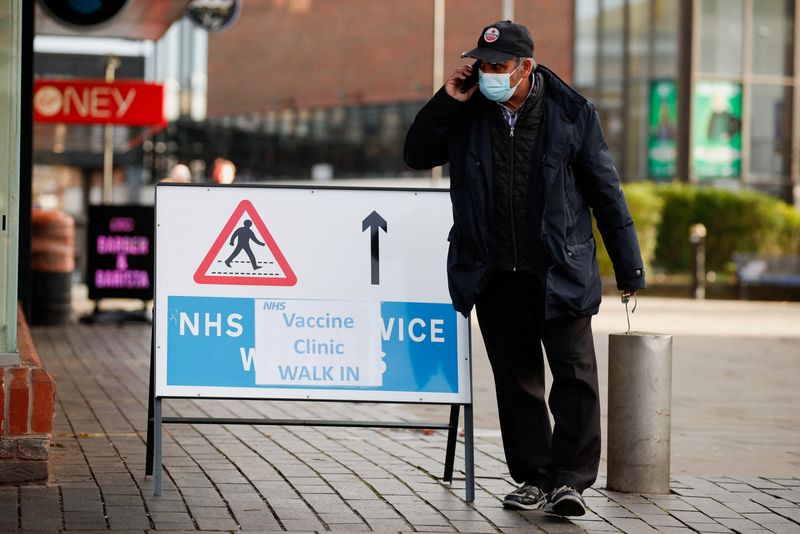By Alistair Smout and William James
LONDON (Reuters) - Britain on Wednesday reported record COVID-19 prevalence for the last week of 2021, with one in 15 people in England infected, as Prime Minister Boris Johnson said cases were increasing at the fastest rate ever.
The increasing number of cases has put huge strains on public services such as hospitals, which face staff shortages and growing admissions.
Johnson has resisted imposing stringent lockdown measures in England. Instead, he has bet that a vaccine booster drive and caution among the population will be enough to constrain the latest wave of infections, despite the arrival of the highly transmissible Omicron variant.
More than 220,000 COVID-19 cases were recorded on one day in the last week, and the provision of services and testing capacity is increasingly under strain.
"We are experiencing the fastest growth in COVID cases that we have ever known," Johnson told lawmakers
"And potentially of greatest concern, case rates are now rapidly rising among the older and more vulnerable, including doubling every week among those over 60, with the obvious risk that this will continue to increase the pressures on our NHS (health service)."
In England, the estimated COVID-19 prevalence was one in 15 for the week ending Dec. 31 - over 6% of the population and up from an estimate of one in 25 for the previous week, the Office for National Statistics said.
ONS figures also showed record prevalence in Scotland, Wales and Northern Ireland, whose governments follow their own policies on combating the pandemic and generally have stricter measures. Scotland and Wales showed prevalance of one in 20 and Northern Ireland one in 25.
In all, an estimated nearly 3.75 million people were infected across the United Kingdom. The death toll from the pandemic is nearly 150,000 people.
The Omicron variant has had the biggest impact in London, where one in 10 people tested positive.
However Johnson reiterated that England could ride out the surge in COVID-19 infections without shutting down the economy, thanks to vaccinations and evidence that Omicron is milder than previous variants, even there is substantial disruption from staff absences as people self-isolate.
"This government does not believe we need to shut down our country again. Instead, we are taking a balanced approach, using the protection of the boosters and the Plan B measures to reduce the spread of the virus, while acting to strengthen our NHS," Johnson said.
The UK Health Security Agency said on Wednesday that people without COVID-19 symptoms who test positive on a rapid lateral flow test in England will not need to confirm the result with a PCR test that needs to go to the lab for processing, a move designed to ease pressure on the testing system.
Johnson also said that testing requirements for travellers would be relaxed from Friday, including scrapping pre-departure tests.
Which stock should you buy in your very next trade?
With valuations skyrocketing in 2024, many investors are uneasy putting more money into stocks. Unsure where to invest next? Get access to our proven portfolios and discover high-potential opportunities.
In 2024 alone, ProPicks AI identified 2 stocks that surged over 150%, 4 additional stocks that leaped over 30%, and 3 more that climbed over 25%. That's an impressive track record.
With portfolios tailored for Dow stocks, S&P stocks, Tech stocks, and Mid Cap stocks, you can explore various wealth-building strategies.
